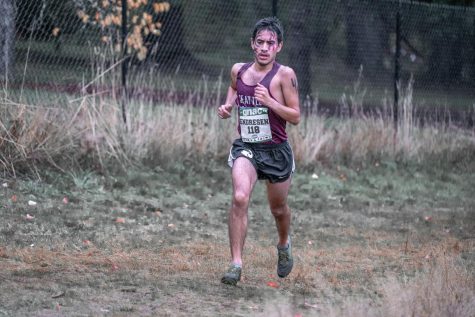Mental health awareness: An athlete’s perspective
May 4, 2022

As an athlete, maintaining good mental and emotional health can be challenging during competitions, whether that is for a soccer match, basketball game or racing in track and field.
I am a cross country and track distance runner, and I can say that running times such as sub-5-minute miles and sub-16-minute 5ks does not come just from training, but also from a positive and prepared elite mental mindset. I don’t just train and become physically capable of running 25 laps around the track for 30-35 minutes, I train mentally for it too.
When I did cross country and track in high school, my coaches never really went over mental health and I felt like it wasn’t much of a problem. Whenever I struggled in a race, I felt like it was just a bad race, or I wasn’t physically prepared for it. I was never concerned about my mental health, even when I found myself struggling in a workout or meet, and I never brought it up with my coaches.
However, when I came to Seattle Pacific University and began competing collegiately, my mental health was beginning to suffer and I struggled to mentally engage in practices and races. My mental wellbeing was beginning to decline due to school and competing in the NCAA level on longer distance runs and against competitors that were way faster than me. There were times when I felt like giving up, like when I began to lose my pace and put up a poor performance.
During my first collegiate meet in December, I raced the 5k for the first time indoors, which was a 25 lap race. As the race progressed, I struggled to stay focused, and I could feel my change in breathing rhythm and tiredness. I ended up finishing badly and got last for the first time ever in my life.
Afterwards, I felt like I disappointed my team and coaches with my terrible performance. I knew that was not the runner I should have been or who I wanted others to see. I felt lost and depressed to the point that I neglected my training when I returned home for the remainder of winter break.
When the indoor season began in January, I decided to step away from competitions for most of the season to focus on rebuilding my mental health and mindset so that I would be able to compete later in the season when I felt like I was ready to race again.
I also did something for the first time that I never really did in high school; I sat down with my coach, discussed my struggles and agreed to work with him during practices to build a better racing mindset. I would focus on trying to be aware of my surroundings and the other competitors in the race, from pace changes to simulating the last lap of the race.
During practices, I saw myself beginning to improve during workouts and I was able to stay with my teammates, even when the pace began to become challenging.
Every week whenever I felt myself struggling, I would motivate myself by saying, “Lord, help me have one more race!,” similar to a prayer that an American World War II veteran, Desmond Doss, said at Okinawa every time he saved a wounded soldier in combat. Those words motivated me to do my best, go the distance and have more amazing races in the future.
All that training and work paid off when I chose to compete in one of the last invites before the postseason in Spokane. I was placed in the 3k and I competed like I wanted to. Halfway through the race, I was aware of the other racers, pace changes and was able to move up. I finished the 3k with a time of 9:38. After weeks of training and believing in myself, I finally felt like my competitive self again.
From that day on, I made it a goal to prioritize my mental health and mindset over the competition, like Team USA Gymnast Simone Biles said at the Tokyo Olympic Games: “Put mental mind first.” Though I wish I could’ve competed more during the indoor season, I felt like this decision was necessary to be able to show the true runner I am.
We all struggle and make mistakes; we all have challenges mentally in competitions and in life. But when we look back at those mistakes and learn from them, we improve on them. When we feel down and defeated, we get up and give it everything we got. No matter if it’s on the basketball court, baseball or softball field, tennis court, soccer field, volleyball court, gymnastics floor, rowing, track or cross-country course; don’t give up until it’s over!

























































































